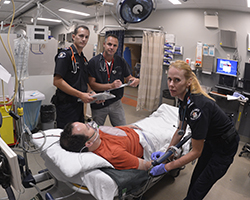Ambulance Paramedics of British Columbia (APBC) represents the 4,400+ paramedics and emergency dispatchers of the province of British Columbia, working in one of the largest ambulance services in the world. Our members provide pre-hospital medical care to 4.9 million people across a land mass over 944,000 square kilometers in size—larger than California, Oregon, and Washington combined. We respond by air, land, and sea to over 500,000 annual 911 calls throughout the province.
Although BC’s health care system is one of the best in Canada, a number of issues have arisen in recent years that require innovative solutions. Many of our larger communities are facing serious paramedic response time delays and Emergency Department overcrowding, as a result of population increase that has outstripped available ambulance services. Metropolitan communities have also seen a sharp increase in ambulance call volumes, in part due to residents who don’t need emergency medical care, but find it difficult to access more appropriate health care services. Smaller and rural communities are facing serious paramedic recruitment and retention problems, as low emergency call volumes make it difficult to justify the expense of full-time paramedic staffing. The withdrawal of locally-funded training has resulted in a steep decline in the number of paramedic applicants for rural communities and thus critical staffing shortages across the province, which leaves many communities facing long periods of time with reduced or no ambulance service.
In this time of fiscal health restraints where human and financial resources are stretched to the limit, innovative designs must be considered for the delivery of rural and urban health care. No two communities have the same ambulance and health care needs, so solutions must be found that are individually tailored. BC’s paramedics are a key part of BC’s health care team, and can be part of the solution to address BC’s health care challenges.
 Community paramedicine is an innovative approach to the delivery of health care services by paramedics that allows them to use their training and expertise in community-based, non-emergency care roles. Community Paramedic (CP) programs have been successfully implemented in other Canadian provinces and in countries such as the US, UK, New Zealand and Australia. For example, in Ontario there are over 48 CP programs in operation; this year the Ontario Ministry of Health and Long-Term Care announced the allocation of $6 million to support the expansion of such programs.
Community paramedicine is an innovative approach to the delivery of health care services by paramedics that allows them to use their training and expertise in community-based, non-emergency care roles. Community Paramedic (CP) programs have been successfully implemented in other Canadian provinces and in countries such as the US, UK, New Zealand and Australia. For example, in Ontario there are over 48 CP programs in operation; this year the Ontario Ministry of Health and Long-Term Care announced the allocation of $6 million to support the expansion of such programs.
For a number of years, APBC’s strategic priority has been the implementation of CP programs in BC, but for new programs such as these to be successful, they need the support and involvement of all stakeholders. To help achieve that support, APBC engaged consultants to research and write a foundation document that explains the full spectrum of CP programs and how they can fit into the BC health care landscape. I am pleased to offer this document to the BC community as a stimulus to discussion and engagement.
As strong patient advocates and the professional voice of paramedics in BC, APBC is excited to be part of the solution to our health care challenges. We look forward to working with the BC Ministry of Health and our health care partners as we move forwards in providing better health care to all BC residents.
In this time of fiscal health restraints where resources, both human and financial, are stretched to the limit, an innovative design for the delivery of primary healthcare to rural communities is being considered. Community Paramedicine, while not a new idea, has never before been used in British Columbia.
Community Paramedicine is defined as a model of care whereby paramedics apply their training and skills in “non-traditional” community-based environments outside the usual emergency/transport model.
Source: Canadian Paramedicine Magazine – Jan 2013
